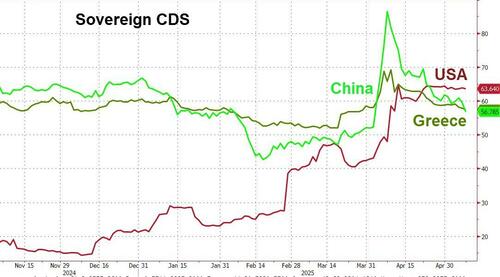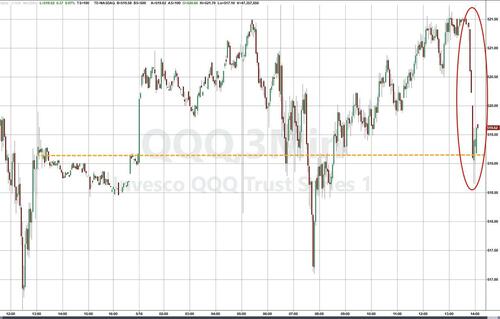Earlier this week, we noted that short-dated USA sovereign CDS were trading wider than China and Greece as trade policy uncertainty and the debt ceiling 'X-date' loomed...
...well, it appears Moody's Rating Agency noted it too... because they just downgraded the Government of United States of America's (US) long-term issuer and senior unsecured ratings to Aa1 from Aaa and changed the outlook to stable from negative.
The one-notch cut comes more than a year after Moody’s changed its outlook on the US rating to negative, with Moody's joining Fitch Ratings and S&P Global Ratings in grading the world’s biggest economy below the top, triple-A position.
This one-notch downgrade on our 21-notch rating scale reflects the increase over more than a decade in government debt and interest payment ratios to levels that are significantly higher than similarly rated sovereigns.
Successive US administrations and Congress have failed to agree on measures to reverse the trend of large annual fiscal deficits and growing interest costs.
We do not believe that material multi-year reductions in mandatory spending and deficits will result from current fiscal proposals under consideration.
Over the next decade, we expect larger deficits as entitlement spending rises while government revenue remains broadly flat.
In turn, persistent, large fiscal deficits will drive the government's debt and interest burden higher.
The US' fiscal performance is likely to deteriorate relative to its own past and compared to other highly-rated sovereigns.
The stable outlook reflects balanced risks at Aa1.
The US retains exceptional credit strengths such as the size, resilience and dynamism of its economy and the role of the US dollar as global reserve currency. In addition, while recent months have been characterized by a degree of policy uncertainty, we expect that the US will continue its long history of very effective monetary policy led by an independent Federal Reserve.
The stable outlook also takes into account institutional features, including the constitutional separation of powers among the three branches of government that contributes to policy effectiveness over time and is relatively insensitive to events over a short period.
While these institutional arrangements can be tested at times, we expect them to remain strong and resilient.
The US' long-term local- and foreign-currency country ceilings remain at Aaa.
The Aaa local-currency ceiling reflects a small government footprint in the economy and extremely low risk of currency and balance of payment crises.
The foreign-currency ceiling at Aaa reflects the country's strong policy effectiveness and an open capital account, reducing transfer and convertibility risks.
Over more than a decade, US federal debt has risen sharply due to continuous fiscal deficits.
During that time, federal spending has increased while tax cuts have reduced government revenues.
As deficits and debt have grown, and interest rates have risen, interest payments on government debt have increased markedly.
Without adjustments to taxation and spending, we expect budget flexibility to remain limited, with mandatory spending, including interest expense, projected to rise to around 78% of total spending by 2035 from about 73% in 2024.
If the 2017 Tax Cuts and Jobs Act is extended, which is our base case, it will add around $4 trillion to the federal fiscal primary (excluding interest payments) deficit over the next decade.
As a result, we expect federal deficits to widen, reaching nearly 9% of GDP by 2035, up from 6.4% in 2024, driven mainly by increased interest payments on debt, rising entitlement spending, and relatively low revenue generation.
We anticipate that the federal debt burden will rise to about 134% of GDP by 2035, compared to 98% in 2024.
Despite high demand for US Treasury assets, higher Treasury yields since 2021 have contributed to a decline in debt affordability.
Federal interest payments are likely to absorb around 30% of revenue by 2035, up from about 18% in 2024 and 9% in 2021. The US general government interest burden, which takes into account federal, state and local debt, absorbed 12% of revenue in 2024, compared to 1.6% for Aaa-rated sovereigns.
While we recognize the US' significant economic and financial strengths, we believe these no longer fully counterbalance the decline in fiscal metrics.
Moody's couldn't help but take a shot at Trump's tariffs:
The US economy is unique among the sovereigns we rate.
It combines very large scale, high average incomes, strong growth potential and a track-record of innovation that supports productivity and GDP growth.
While GDP growth is likely to slow in the short term as the economy adjusts to higher tariffs, we do not expect that the US' long-term growth will be significantly affected.
But they did say something positive...
Despite reserve diversification by central banks globally over the past twenty years, we expect the US dollar to remain the dominant global reserve currency for the foreseeable future.
...
Moreover, the resilience of the US sovereign rating to shocks is supported by strong monetary and macroeconomic policy institutions.
Although policy has been less predictable in recent months, relative to what has typically been the case in the US and other highly-rated sovereigns, we expect that monetary and macroeconomic policy effectiveness will remain very strong, preserving macroeconomic and financial stability through business cycles.
The timing is exceptional, as Republicans try to get Trump's 'big beautiful bill' out of committee... and as everyone knows, there's no such thing as a coincidence in Washington.
US equity markets are trading down after hours on the news:
Trump's gonna be pissed!!
Loading...


